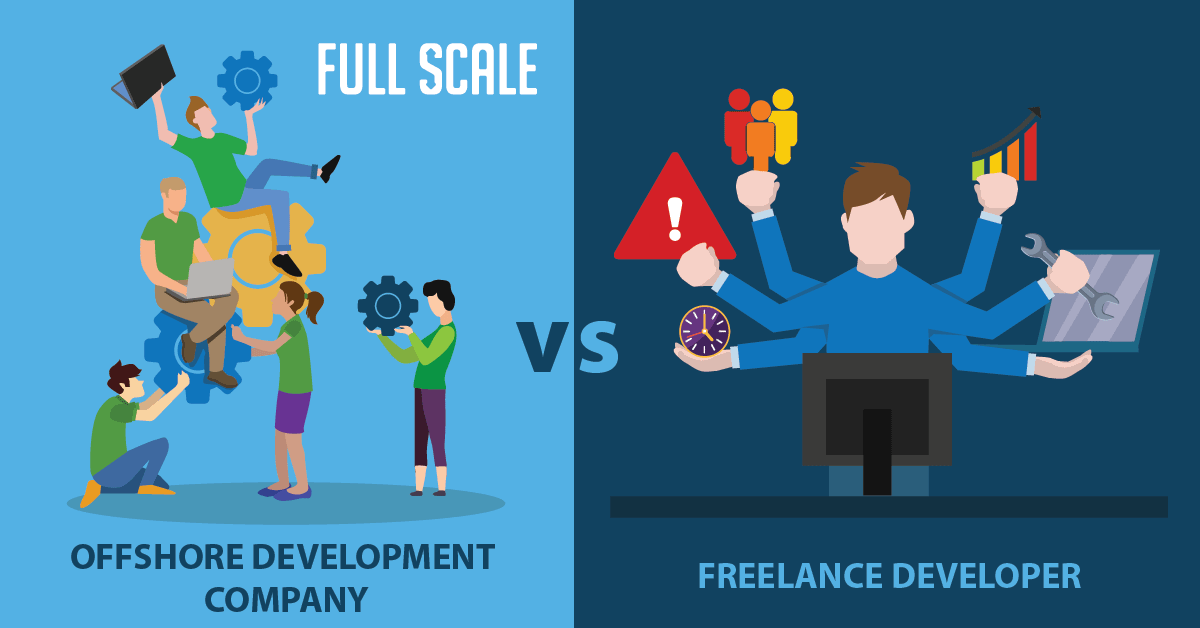Last Updated on 2025-05-30
Are you considering hiring software developers in the Philippines? This how-to guide will help you work with developers in this tropical destination.
Remote work setups have been commonplace in the IT industry for a long time. Businesses of all sizes use this setting for cost-effective benefits. Moreover, many look for freelance talent abroad to further reduce operational expenses.
Since the COVID-19 pandemic broke out, several industries were forced to operate in remote work settings, either onshore or offshore.
One top destination for remote software work is the Philippines, where Full Scale has based its international operations. With the following points, you’ll get an insight into how you can work most effectively with software developers in this Asian country.
- Software Development in the Philippines: An Overview
- How to Work with Software Developers in the Philippines
- Tips on Improving Workflows with Remote Employees
- Hire Software Developers in the Philippines
Software Development in the Philippines: An Overview
For many years, the Philippines has been one of the top destinations for investors in the IT-BPM industry. The archipelago hosts different kinds of talent in various information technology jobs. These include customer support, call centers, data entry, software development, etc.
Here are reasons why many US-based companies explore working with developers in the Philippines.
1. English communication skills
Filipinos have a great gauge of the English language. In Asia, the Philippines places 2nd, just behind Singapore, in the most English-proficient countries list. This means that you can already eliminate language barriers as a challenge.
2. Western-style culture
The Philippines was a colony of America from 1898 to 1946. As a result, the modern-day Philippines has retained many American influences.
Proficiency in the English language is just one prime example. Up to today, Filipinos engage with American culture in different fields such as entertainment, sports, pop culture, music, and more.
3. Wide pool of tech talent
As a hub for multiple IT jobs, the archipelago offers a wide range of tech talent. Through Full Scale, you can hire software developers, software testers, project managers, digital marketers, etc.
With this high demand for IT-related jobs, many students pursue IT and engineering college programs. As a result, more STEM graduates flourish in the country annually. These graduates contribute to the growing pool of qualified software developers in the Philippines.
How to Work with Software Developers in the Philippines
Now, the rising question would be how do you hire software developers from the Philippines?
You have two choices. One, you can hire a freelance developer from job sites. Or, you can partner with a reliable offshore software development company. Let’s discuss each option.

Working with a Freelance Developer
By definition, a freelancer is a self-employed individual who receives tasks but is not a regular team member of a company. Mainly, this setting allows flexibility regarding working arrangements. Let’s look at the pros and cons of hiring a freelance developer.
Pros
- Working with freelance developers enables time flexibility in the processes. Freelancers are not limited to 8-hour workdays. You can adjust your contracts depending on their commitment and your requirements.
- Because of time flexibility, you can speed up the project delivery. Freelance developers are motivated to finish projects fast to move on to the next one.
- Ideal for a lower-level commitment on smaller, short-term projects.
Cons
- Freelancers may be difficult to manage. Because of the work setting, you don’t have much control over how they manage their tasks or when they can deliver them.
- Working with freelance developers often entails having narrowly-focused expertise. You only hire them for specific tasks. So, it could mean that their skill sets are limited.
- There are security risks when working with freelancers. While you can facilitate NDAs and contracts, you cannot fully assure how they deal with data and private information. Without a legal entity in a foreign country, your recourse is limited at best.
- With limited resources, support, and expertise, freelancers may have difficulty maintaining quality. It’s rare to find a developer who is exemplary in quality assurance.
- Lack of dedication. Since freelancers control their time, they can also accept other jobs from other people. So, there could be a lack of focus that would result in a failure in task delivery.
- Lack of institutional memory. Let’s say you hire a freelancer to build an app. Six months later, you want to make updates, but that freelancer is no longer available. Bringing in a new developer will drastically increase your cost (and introduce bugs or bloat) as they take the time to familiarize themselves with someone else’s code.
With these pros and cons, you need to consider whether hiring a freelancer is for you carefully. To hire a freelance developer from the Philippines, you can try popular job sites like Upwork or Freelancer.
If the signs tell you that it’s not your preference, you have another option. That is hiring an offshore software development company.
Working with an Offshore Software Development Company
In essence, offshoring is the business process that involves relocating your operation (or a part of it) to another country. How does this happen?
One, you can use offshore as a subsidiary. You build a new arm of your own company in another country. So, it still has the same name under the same management and leadership. However, this is costly and more tedious. And this is primarily applicable to bigger companies.
The more affordable option for most businesses is offshoring using a partner software development company.
At Full Scale, we cater software development services to clients across the globe through our development arm in the Philippines.
Learn more about offshoring in this entry: Everything You Need to Know About Offshore Software Development
This model, however, is different from outsourcing. In contrast, outsourcing is handing over the key to a third-party company to do a part of the work. Meanwhile, in offshoring, you’re simply scaling your team through a service provider while having control and leadership over the development. This model comes with specific pros and cons.
Pros
- You can access a wider talent pool. There is an ongoing developer shortage in the US market. When you work with software developers in the Philippines, you can hire from a much larger pool of talent.
- Offshore hiring is cost-effective. When you partner with offshore software development companies, you usually pay a fraction of the total amount you would in the US.
- You can build high-quality software at a lower price. The affordable developer rate in other countries is according to their local market. So, you can hire top-notch developers without breaking the bank.
- Avoid overhead fees when offshoring. You don’t have to worry about office space or equipment purchases when partnering with an offshore company. The service provider equips its developers with the tools and devices to get on with work.
- Experience convenience in recruitment. You can bypass the hiring and assessment process of software developers. Offshore software development companies like Full Scale provide you with developers who’ve already undergone exams and background checks. You just define the skills and experience you require, and the partner company will handle it for you.
- Offshore software companies give you peace of mind regarding security and legalities. Since they are established companies within their respective countries, they follow local regulations regarding employment and operation. If the company has a US office, you also have legal recourse if something goes wrong overseas.
- Control the timeframe and project specifics. Software development companies have management and development processes. So, you can get specific project roadmaps, estimates, and expenses.
Cons
- One concern with offshore software development is time flexibility. Since the developers work full-time for the company, they also work the typical 8-hour days, which may only overlap your workday by a few hours.
- The software development industry is competitive. Because of this, some companies may take longer to find the right developers for you. The best companies will even turn away clients if they feel they’d be a poor fit.
Offshore software development is the ideal solution for companies that have struggled to hire and retain developers in their local market. Some benefits come with it, such as ease in recruitment, cost-effectiveness, and employee retention. You can learn more about the benefits of offshoring in this entry: Benefits of Hiring IT Professionals from the Philippines.
Tips on Improving Workflows with Remote Employees
In this discussion, it’s important to establish best practices in remote development to yield optimum results. Here’s a rundown of things you need to do when working with software developers in the Philippines.
1. Work with a reputable software company.
The Philippines’ richness in IT talent makes it a hub of hundreds of tech companies. However, not all of these companies are equal. You should look for the best IT companies with a repertoire of satisfied clients. At Full Scale, we have delivered more than 2 million hours of work to our global clients.
2. Establish overlap hours.
There is a clear timezone margin in offshoring that may become a challenge, but you can still enjoy software development success by establishing overlapping hours with your remote counterpart.
Optimize the overlapping time for meetings and daily updates. Many of our clients start their mornings with daily check-ins to review the work done overnight. Clients then have all day to provide feedback or address issues before their team comes back online the next evening.
3. Organize your communication methods.
Speaking of communication, you need to implement workflows that promote effective communication. For example, you can create an escalation path regarding relaying project information. So when there are concerns, everyone knows who to contact.
4. Practice product management and ownership.
Any software project will fail when there is a lack of product management and ownership. When you hire software developers, you or someone from your organization has to take the lead in realizing the software product. This role is even more critical when working with remote employees. Here are a few things to remember:
- Establish the long-term goal of the project
- Make the team understand what the product is
- Document the processes and make sure the developers do the same
- Plan out the work breakdown structure and lay it out in sprints based on priority or dependencies
- Use project management tools like ClickUp or Jira
- Schedule daily sync-up meetings with your remote developers
You can check out our blog on Offshore Development: 8 Keys to Success to find more valuable offshore tips.
Hire Software Developers in the Philippines
Do you want to work with talented software developers in the Philippines? Full Scale has got you covered!
Full Scale is one of the fastest-growing agile offshore software development companies in the country. For years, we have provided our clients with software developers through our Philippine office.
As we grow, we gain access to a broader pool across the archipelago through our nationwide recruitment. Our IT talent roster comprises software developers, QA testers, SEO experts, content writers, and graphic designers.
At Full Scale, we deliver fast, low-cost services that suit your needs. We also manage the entire hiring process to ensure you get the best tech talent onboard.
Hire Offshore Developers from Full Scale today!

Matt Watson is a serial tech entrepreneur who has started four companies and had a nine-figure exit. He was the founder and CTO of VinSolutions, the #1 CRM software used in today’s automotive industry. He has over twenty years of experience working as a tech CTO and building cutting-edge SaaS solutions.
As the CEO of Full Scale, he has helped over 100 tech companies build their software services and development teams. Full Scale specializes in helping tech companies grow by augmenting their in-house teams with software development talent from the Philippines.
Matt hosts Startup Hustle, a top podcast about entrepreneurship with over 6 million downloads. He has a wealth of knowledge about startups and business from his personal experience and from interviewing hundreds of other entrepreneurs.





